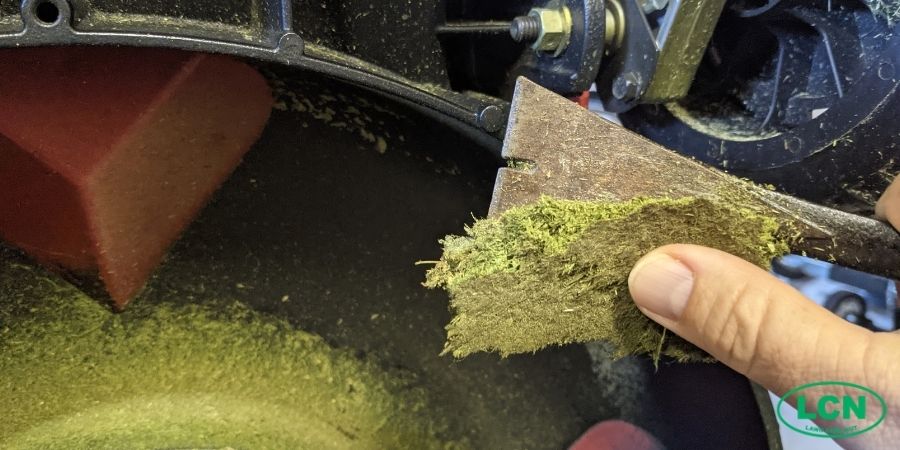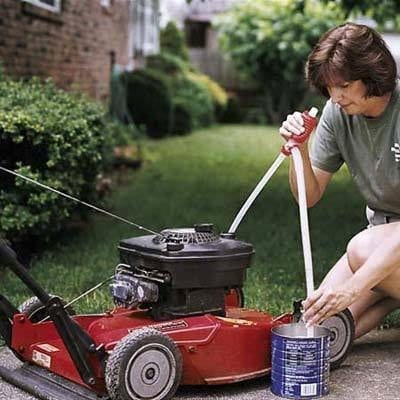Have you ever wondered what happens if you leave gas in your lawn mower over the winter months? It’s a question that many homeowners face as the cold season approaches.
You might think it’s no big deal, but what you decide could impact your mower’s performance when spring rolls around. Imagine pulling out your mower on the first warm day, ready to tackle your overgrown lawn, only to find it sputtering and failing to start.
This scenario is more common than you might think, and it all boils down to a simple decision made months prior. By understanding the consequences and knowing how to prevent them, you can save yourself from costly repairs and ensure your mower is ready to go when you need it. Read on to uncover the truth about leaving gas in your lawn mower over the winter and how to keep your equipment in top shape.
Effects Of Leaving Gas In A Lawn Mower
Storing gas in a lawn mower over winter can cause engine issues. Old gas clogs and damages parts. This results in poor performance and costly repairs.
Leaving gas in your lawn mower over winter might seem harmless, but it can lead to a range of issues. You might think it’s just fuel sitting in a tank, but the reality is quite different. Over time, gas can degrade, causing damage that may prevent your mower from starting when spring rolls around. ###Gasoline Degradation
Gasoline isn’t as stable as you might assume. It can start to break down after just 30 days. Over winter, this degradation can lead to the formation of gum and varnish, clogging up the fuel system. Imagine trying to start your mower only to find it struggling due to these blockages. It can be frustrating and costly to repair. ###Moisture Buildup
Have you ever noticed water droplets forming inside a fuel tank? This happens because of condensation. When gas is left in a lawn mower, moisture can accumulate, leading to rust and corrosion inside the tank and carburetor. This might result in costly repairs or replacement of parts. Wouldn’t you rather spend your money on something more enjoyable than mower repairs? ###Difficulty Starting The Mower
Remember the last time your mower refused to start on the first pull? Old gas could be the culprit. Stale fuel can make it hard for the engine to ignite, leaving you with a lawn that remains untended. This inconvenience is easily avoidable by simply draining the gas before winter sets in. ###Potential For Expensive Repairs
Who wants to face a hefty repair bill come spring? Leaving gas in your mower over the winter can lead to a series of mechanical issues. These include clogged carburetors and damaged fuel lines, all leading to costly repairs. Spending a few minutes to drain or stabilize your fuel can save you a lot of trouble and money. ###Environmental Impact
Did you know that old gas can be harmful to the environment? When it breaks down, it can release harmful vapors and leak contaminants. By properly disposing of or storing gas, you contribute positively to environmental conservation. It’s a small step, but every bit helps. By taking simple steps like draining your lawn mower’s gas before winter, you can avoid these issues. It saves you time, money, and frustration. Plus, it ensures that your mower is ready to go when the grass starts growing again. What precautions will you take this winter?
Credit: www.mainstreetmower.com
Steps To Prepare Your Lawn Mower For Winter
Leaving gas in a lawn mower over winter can cause damage. Empty the tank to prevent stale fuel and corrosion. Run the engine until it stops to clear the carburetor and fuel lines. Store the mower in a dry place, ensuring it’s clean and protected from the elements.
Preparing your lawn mower for winter is an essential step to ensure it remains in peak condition. Leaving gas in your mower over the cold months can lead to corrosion, clogged fuel systems, and even engine damage. But with a few simple steps, you can prevent these issues and prolong the life of your machine. Let’s dive into the practical actions you can take to winterize your lawn mower. ###Drain The Fuel Tank
Begin by removing all the gas from your lawn mower. You can use a siphon pump to transfer the gas into a container safely. This is crucial because leaving fuel in the tank can lead to gum deposits that damage the engine. ###Run The Engine
After draining the tank, start the mower and let it run until it stalls. This ensures that all the residual fuel is burned off, preventing build-up in the carburetor. ###Clean The Mower
A clean mower is a happy mower. Use a cloth or brush to remove grass clippings and debris from the blades and undercarriage. This prevents rust and keeps everything functioning smoothly. ###Change The Oil
Old oil can become thick and gummy over time. Drain the existing oil and replace it with fresh oil to keep the engine lubricated and ready for spring. ###Inspect The Spark Plug
Check the spark plug for wear or damage. If it’s dirty or corroded, replace it. A healthy spark plug ensures your mower starts easily after winter. ###Store Properly
Finally, find a dry, sheltered spot to store your mower. Cover it with a tarp or specialized mower cover to protect it from dust and moisture. Taking these steps not only prepares your lawn mower for winter but also saves you time and money come spring. Have you ever neglected these steps and faced a stubborn mower when the snow melted? Consider this your reminder to act and avoid frustration.Alternative Storage Solutions
Storing gas in a lawn mower over winter can lead to engine issues. Consider using fuel stabilizers to prevent problems. Proper storage solutions help extend the mower’s life and ensure smooth operation next season.
Storing your lawn mower properly during winter is crucial to ensure it starts up smoothly come spring. One common question is whether you can leave gas in your mower during the cold months. While some people opt for fuel stabilizers, there are alternative storage solutions that can help maintain your lawn mower’s performance without the hassle.Use A Fuel Stabilizer
Adding a fuel stabilizer is a straightforward solution. It’s a chemical that prevents the gas from breaking down over time. Simply pour the stabilizer into your gas tank and run the engine for a few minutes. This ensures that the treated fuel circulates through the system. It’s an easy step that can save you from future frustrations.Drain The Gasoline
Draining the gasoline is another effective method. It might seem like a tedious task, but it ensures no fuel remains to clog your carburetor. Use a siphon pump to remove the gas, and run the mower until it stops. This method clears any residual fuel from the system, making it a reliable option.Consider Using Ethanol-free Gas
Ethanol-free gas can be a game-changer for winter storage. Ethanol attracts moisture, which can lead to engine issues. Using ethanol-free gas reduces this risk and offers a cleaner burn. It’s a bit pricier but might be worth it if you want to avoid fuel-related problems.Store In A Dry, Safe Place
The location of your storage matters. Make sure to store your lawn mower in a dry, sheltered area. Moisture is your engine’s enemy during winter. A garage or shed works best, but even a covered space outside can suffice if it’s protected from the elements.Regular Maintenance Checks
Don’t forget regular maintenance checks. Before storing your mower, inspect it for any existing issues. Addressing small problems now can prevent larger issues later. Clean the blades and check the oil to ensure everything is in good condition. What method will you choose for your lawn mower this winter? Remember, taking a few extra steps now can save you time and money when spring rolls around.
Credit: www.milorganite.com

Credit: www.goldeagle.com
Conclusion
Winter storage can harm your lawn mower’s gas tank. Gas left inside may cause damage. Drain the tank before the cold months arrive. Use a fuel stabilizer if you can’t empty it. This helps prevent clogs and corrosion. Regular maintenance ensures your mower lasts longer.
Store it in a dry, safe place. Protect the mower from moisture and freezing temperatures. Taking these steps saves you time and money. Enjoy a smooth start next mowing season. Your lawn will thank you.

